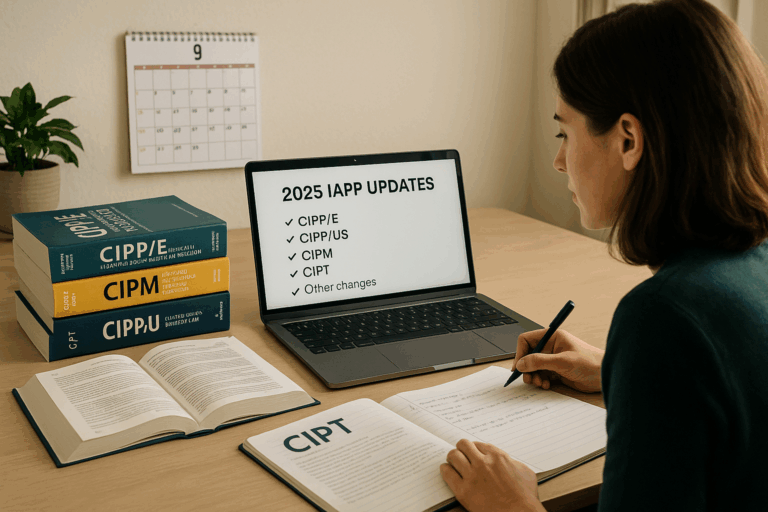Study Tips: Exam Structure and Policies
Preparing for an International Association of Privacy Professionals (IAPP) certification exam, such as the Certified Information Privacy Professional/Europe (CIPP/E), Certified Information Privacy Manager (CIPM), or Artificial Intelligence Governance Professional (AIGP), is a major step in advancing your privacy career. Mastering the content is essential, but understanding the exam structure and the policies that govern it can make all the difference. When you’re familiar with the exam format and the IAPP rules, you’ll feel more confident and prepared. This will allow you to avoid last-minute surprises and focus on performing your best.
Exam Structure: Understanding the Assessment
Types of Questions: Application Over Memorization
IAPP exams consist of multiple-choice questions designed to assess how well you apply privacy concepts. These questions go beyond simple fact-recall. Instead, they often present case studies or real-world scenarios where you need to apply your knowledge. This approach tests your ability to handle privacy challenges in practical situations. It ensures that you can solve complex problems once you’re certified.
Understanding how these questions work is essential. You may need to analyse data breaches, compliance issues, or new regulations. In these cases, you’ll be expected to identify the correct course of action. Knowing definitions and laws is part of it, but being able to apply them is the real challenge.
Number of Questions and Exam Length: Manage Your Time
Core IAPP exams, such as the CIPP/E, CIPM, and CIPT, contain 90 questions. Of these, 75 are scored, while 15 are unscored pre-test items. These trial questions don’t contribute to your score but are used by the IAPP to evaluate future questions. It’s crucial to treat all questions with the same level of focus.
You’ll have 150 minutes (2.5 hours) to complete the exam, including an optional 15-minute break. Once you submit the first half of the exam, you cannot go back. Managing your time well is vital to ensure you attempt all the questions. A pacing strategy—like spending about 1.6 minutes per question—helps avoid running out of time, especially with scenario-based questions.
Exam Blueprints: Your Strategic Study Guide
The IAPP provides detailed exam blueprints for each certification. These blueprints outline the topics covered and the weight assigned to each. They act as a roadmap for your study efforts. By focusing on the areas that carry the most weight, you can prepare efficiently.
For instance, if the blueprint shows that a significant portion of the CIPM exam focuses on privacy program management, allocate more time to this area. Focusing on high-weighted topics helps ensure you’re ready for the most critical sections.

Five Essential Study Tips for IAPP Exams
- Know Your Exam Blueprint
The blueprint is your most valuable study tool. Review it thoroughly to understand which topics are covered and how heavily each is weighed. Prioritize your study efforts based on this information, focusing on areas that carry more questions.
When selecting practice tests, ensure they follow the exam blueprint for accurate question distribution and mirror real exam structure conditions, like the trial exams from 22Academy.
- Practice Applying Your Knowledge
Since many exam questions require you to apply privacy principles in real-world situations, it’s important to practice with case studies and scenario-based exercises. This will help you strengthen your problem-solving and critical thinking skills. - Manage Your Time Wisely
With 150 minutes to answer 90 questions, effective time management is key. Use practice exams to develop a pacing strategy. Aim to complete each question in approximately 1.6 minutes, and avoid getting stuck on difficult questions—move on and come back to them if time allows. - Review the IAPP’s Exam Policies
Before exam day, make sure you’re familiar with the IAPP’s policies regarding registration, scheduling, identification requirements, and accommodations. Understanding these policies can prevent unnecessary stress and ensure a smooth exam experience. - Stay Informed About Exam Updates
The IAPP updates its certification exams annually to reflect new laws, regulations, and best practices. Be sure to check for any updates to ensure you’re studying the most current material.
Exam Policies: Ensuring a Smooth Experience
Exam Registration and Scheduling
You can purchase IAPP exams anytime from the IAPP Store, but scheduling comes after purchase. Once you’ve made your purchase, you have one year to schedule and take the exam. Schedule at least 24 hours in advance to give the testing center or online proctor time to prepare.
Identification Requirements: Avoiding Exam Day Issues
Before scheduling your exam, ensure that the name on your MyIAPP profile exactly matches the name on your government-issued ID. You will need to present two forms of ID on exam day, and discrepancies can lead to check-in problems. Pearson VUE, the IAPP’s testing partner, uses AI software to compare your ID photo to a photo taken onsite, so double-check all details.
Special Accommodations: Ensuring Fairness for All
The IAPP is committed to providing reasonable accommodations for candidates with disabilities. If you require accommodations, start the request process early—preferably more than 30 days before the exam date. This allows enough time for the IAPP to review your request and ensure you have the support you need on exam day.
Exam Day Procedures and Ethical Standards
Before starting the exam, you must sign both a Candidate Application Statement and a Confidentiality Agreement electronically. These documents confirm that you meet the eligibility requirements and agree to uphold IAPP’s ethical standards. They also affirm that you won’t disclose exam content. Violating these agreements can result in disqualification or loss of certification.
Important Note: Since the exam clock starts as soon as you begin signing these agreements, I think this setup is unfair to candidates. Given the high fee and the importance of understanding what you’re agreeing to, this practice puts undue pressure on test-takers to rush through legal commitments. For an organization dedicated to ethical standards, IAPP should provide time to review these documents thoroughly before the official exam time begins.
Staying Updated: The Importance of Continuous Learning
The privacy landscape evolves constantly, and IAPP certification exams are updated annually to reflect new regulations and best practices. These updates typically change 10-15% of the Body of Knowledge. The IAPP provides at least 90 days’ notice before implementing any changes, so check for announcements and adjust your study plan as needed.
Your Path to Success
Understanding the exam structure and policies of IAPP certification exams is crucial for successful preparation. By knowing what to expect—whether it’s the types of questions, time limits, or the exam day rules—you can reduce surprises and focus entirely on your performance. Being well-prepared means mastering both the content and the exam format. Following the right strategies will guide you toward a smooth exam experience and boost your confidence.
For additional support, 22Academy offers a range of tailored resources for IAPP exams. Their comprehensive study guides, mock exams, and scenario-based exercises reflect the latest exam structure. These tools will help you strengthen your understanding of privacy concepts and improve your ability to apply them in real-world contexts. With 22Academy’s products, you’ll enhance your knowledge, refine your time management, and sharpen your problem-solving skills, setting you up for exam success.






